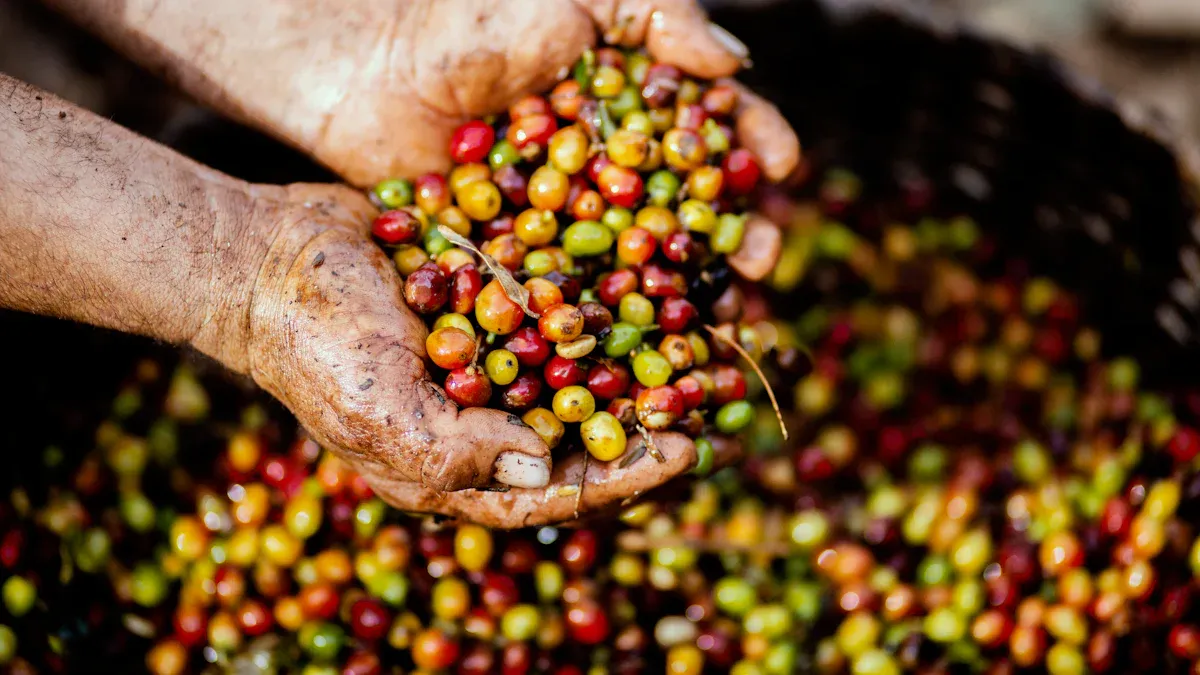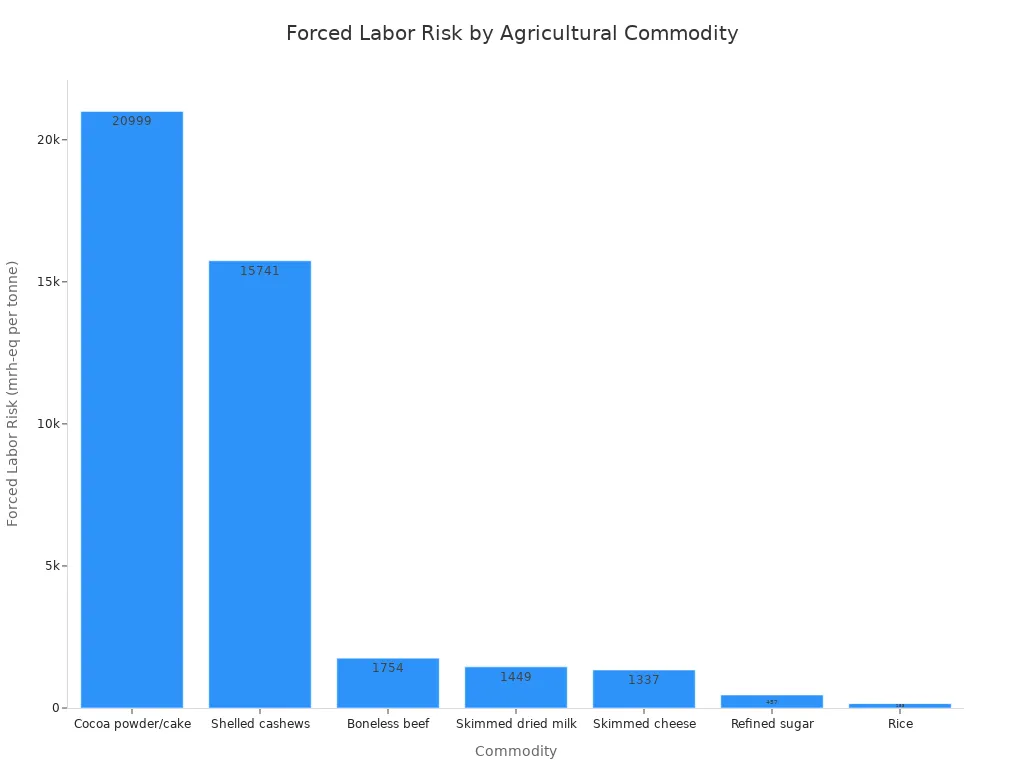Ethical Sourcing and Fair Labor in Nutrition
Table of Contents

Fair labor practices represent a fundamental commitment. They ensure every worker in the nutrition supply chain, from farmers to factory staff, receives dignity and respect. Approximately one billion people work in global agriculture, making this commitment vital. An ethical supply chain is built on core principles for a sustainable future. Responsible sourcing requires transparency and sustainable methods. These principles include:
- Fair wages
- Safe working conditions
- A zero-tolerance policy for forced and child labor
- The right to organize
This ethical sourcing approach helps protect vulnerable farmers and creates a truly sustainable and just food system. Sustainable sourcing and transparency are essential for a sustainable industry.
THE PILLARS OF ETHICAL SOURCING AND FAIR LABOR

Ethical sourcing rests on three non-negotiable pillars. These principles form the foundation of a just and sustainable food supply chain. They ensure that the production of nutritious food also supports the well-being of the people who grow, harvest, and process it. Companies committed to an ethical supply chain must actively uphold these standards.
FAIR COMPENSATION AND LIVING WAGES
Fair compensation goes beyond the legal minimum wage. It centers on providing a living wage. A living wage allows workers to afford a decent standard of living for themselves and their families. This is a cornerstone of ethical sourcing.
Paying a living wage empowers farmers and workers. It breaks cycles of poverty and helps build resilient communities. When smallholder farmers earn fair prices, they can invest in more sustainable farming practices, improving both their livelihoods and environmental outcomes. Achieving this requires transparency and a commitment to traceability throughout the supply chain. Several organizations have successfully championed this cause.
| Company/Initiative | Policy/Program | Impact on Wages |
|---|---|---|
| Coalition of Immokalee Workers (CIW) | Negotiated a penny-per-pound surcharge for tomatoes | Increased pay for tomato pickers by 74% |
| Ethical Trading Initiative (ETI) | Requires members to commit to wages meeting basic needs | 15% of member improvements relate to wages |
| Starbucks and Arizona State University | Program for employees to earn online university degrees | Improves long-term wage potential through education |
SAFE AND HEALTHY WORKING CONDITIONS
Every worker has the right to a safe workplace. Agriculture, however, is one of the most dangerous industries globally. Workers face numerous risks that can lead to injury, illness, or death. Building responsible agricultural supply chains means actively mitigating these dangers.
⚠️ Common Hazards in Agriculture Include:
- Transportation incidents involving tractors and other vehicles.
- Exposure to harmful farm chemicals like pesticides and fertilizers.
- Falls from ladders, equipment, or grain bins.
- Musculoskeletal pain from repetitive and strenuous tasks.
- Exposure to extreme weather, leading to heatstroke or hypothermia.
- Mental health challenges stemming from financial stress and isolation.
The International Labour Organization (ILO) provides a framework for safety. The ‘Safety and Health in Agriculture Convention, 2001 (No. 184)’ sets international legal standards. This convention, along with its ‘Code of Practice’, guides governments and companies in preventing accidents and diseases. These standards promote a positive safety culture and acknowledge the specific risks faced by women, who are a majority of the agricultural workforce. True sustainable sourcing depends on protecting the health and safety of all farmers.
ERADICATING FORCED AND CHILD LABOR
Forced and child labor are severe human rights violations. They have no place in an ethical supply chain. Yet, they remain a dark reality in parts of the global food system. Implementing ethical sourcing requires a zero-tolerance policy and proactive measures to identify and eliminate these practices.
The statistics are staggering. Agriculture accounts for the majority of child labor worldwide.
- Over 98 million girls and boys work in agriculture.
- Agriculture is one of the three most dangerous sectors for children.
- Most child laborers are unpaid family members, often starting work between 5 and 7 years old.
Certain commodities carry a higher risk. Full traceability and transparency are critical for identifying and addressing forced labor in these high-risk areas. Responsible sourcing demands that companies investigate their supply chains deeply.

Eradicating these abuses requires a multi-faceted approach. Successful programs show that change is possible.
- Mandatory Due Diligence: Laws that require companies to identify and remediate child labor in their supply chains.
- Trade Leverage: Using trade agreements and government contracts to penalize supply chains that use child labor.
- Corporate Accountability: Pushing companies to achieve full traceability of their supply chains and publicly disclose suppliers.
- Community-Centered Strategies: Investing in local services, family livelihoods, and community monitoring to address the root causes of child labor.
These pillars—fair wages, safe conditions, and freedom from exploitation—are essential for building truly sustainable food supply chains. They ensure that our pursuit of nutrition does not come at the cost of human dignity. For smallholder farmers and factory workers alike, these fair labor practices are the bedrock of a just and sustainable future. The path to a better system is paved with transparency, accountability, and robust traceability.
THE IMPACT ON SUSTAINABLE FOOD SUPPLY CHAINS

Ethical sourcing creates a powerful ripple effect. It extends far beyond individual farms and factories. This approach strengthens communities and builds brand value. It is a core component of truly sustainable food supply chains. When companies invest in fair labor, they invest in a more stable and prosperous future for everyone. This commitment fosters economic resilience and protects vital ecosystems.
BUILDING SUSTAINABLE AND EMPOWERED COMMUNITIES
Fair labor practices are the foundation for strong communities. When farmers and workers earn a living wage, they can invest in their families and local economies. This empowerment directly contributes to more sustainable food supply chains. For example, Fair Trade programs use social premiums to fund community-led projects. A democratic committee of workers and farmers decides how to invest these funds. This process ensures the money addresses the most critical needs.
These community development funds often support projects that improve daily life, including:
- Building schools and healthcare clinics
- Providing clean drinking water and better housing
- Offering leadership training and scholarship funds
Empowered farmers are also better equipped to adopt sustainable farming methods. Training programs in water conservation and soil health help create responsible agricultural supply chains. This focus on education and empowerment helps smallholder farmers improve their livelihoods. It also promotes environmental responsibility, making local ecosystems healthier. Better training for farmers leads to more sustainable outcomes.
THE BUSINESS CASE FOR BRAND TRUST
A commitment to an ethical supply chain is also smart business. Consumers increasingly demand transparency from the brands they support. Many shoppers are willing to pay more for products that guarantee fair labor and sustainable sourcing. Recent surveys show that over half of all consumers will pay a premium for sustainable products. This creates a clear market advantage for companies that prioritize ethical sourcing. Full traceability helps build this trust.
Brands that demonstrate a real commitment to their farmers see significant returns. They build stronger consumer loyalty and increase their market share. This requires deep traceability and clear communication. The investment in a sustainable and ethical framework pays off.
| Brand | Ethical Practice | Business Outcome |
|---|---|---|
| Nestlé | Implements the Nescafé Plan for responsible coffee sourcing. | Attracted consumers who value ethical products, gaining market share. |
| Unilever | Supports smallholder farmers through its Sustainable Living Plan. | Boosted its reputation and consumer trust, leading to stable growth. |
Ultimately, robust traceability and transparency are essential. They prove a company’s commitment to building sustainable food supply chains. This builds a loyal customer base and a more sustainable business model.
HOW TO IMPLEMENT AND VERIFY FAIR LABOR PRACTICES
Implementing ethical sourcing requires clear systems for accountability. Companies must establish robust methods to ensure their partners uphold fair labor standards. This process involves setting expectations, using technology for transparency, and relying on trusted certifications. These steps are crucial for building sustainable food supply chains and a truly ethical supply chain.
SUPPLIER CODES AND AUDITS
Companies begin implementing ethical sourcing by creating a Supplier Code of Conduct. This document sets clear, non-negotiable labor standards for all partners. It is a foundational tool for transparency. Key requirements often include:
- Freely chosen employment and no forced labor
- Avoidance of child labor
- Fair wages, benefits, and working hours
- Humane, non-discriminatory treatment
- Safe and healthy working conditions
Companies then use audits to verify compliance. Audits can be internal (first-party) or external (third-party), each with distinct advantages.
| Feature | First-Party Audits (Internal) | Third-Party Audits (External) |
|---|---|---|
| Advantage | Cost-effective; deep internal knowledge | Impartial; provides credibility |
| Disadvantage | Potential for bias; less credibility | Higher cost; may miss internal details |
However, audits have limitations. Auditing firms acknowledge that standard methods are not designed to detect sensitive issues like harassment. Supplier deception and conflicts of interest can also hide violations. Therefore, audits are one part of a larger strategy for ensuring fair labor practices. A sustainable approach requires more than just audits; it needs deep traceability.
THE ROLE OF TECHNOLOGY AND TRACEABILITY
Technology offers powerful solutions for creating transparency and traceability. Digital tools help track products from the farm to the consumer, making the entire journey visible. Blockchain technology, for example, creates a secure and unchangeable digital record. Each step, from the farmers to the retailer, is logged. This level of traceability allows companies like Nestlé and Walmart to verify claims and quickly trace products. This traceability is key to a sustainable system.
💡 How Blockchain Boosts Traceability: Consumers can scan a QR code on a coffee bag to see data on the farmers, harvest times, and fair trade certifications. This direct link builds trust through radical transparency and traceability.
Other digital tools also enhance traceability. Mobile apps like Harvust allow workers to report grievances anonymously, giving companies direct insight into workplace conditions. Supply chain mapping software provides greater visibility into sub-tiers, helping manage risks proactively. This complete traceability is essential for a sustainable future. The goal is full traceability for all products. This traceability helps build sustainable food supply chains.
KEY FAIR LABOR CERTIFICATIONS
Certifications serve as a trusted signal to consumers. They show that a product meets specific standards for ethical sourcing. These labels help shoppers make informed choices. Three well-known certifications are:
- Fair Trade: This certification ensures farmers receive a guaranteed minimum price and an additional premium for community development. It focuses on fair compensation, safe working conditions, and the elimination of forced and child labor. This sustainable model empowers communities.
- B Corp: B Corp certification assesses a company’s entire social and environmental performance. It requires businesses to commit to stakeholder governance and meet high standards for “Fair Work” and “Justice, Equity, Diversity, & Inclusion” (JEDI). It is a holistic mark of a sustainable business.
- Rainforest Alliance: The “frog seal” signifies that a product was made using methods that support social, economic, and environmental pillars of sustainability. The standard requires fair wages, safe conditions for workers, and the protection of ecosystems. This certification promotes a sustainable and ethical approach.
Ethical sourcing is a non-negotiable pillar for a sustainable nutrition industry. This commitment builds a sustainable, ethical supply chain and ensures long-term, sustainable business success. It requires transparency and complete traceability. Sustainable brands use traceability to prove their sustainable values.
Consumers can support these sustainable companies. Businesses must invest in sustainable systems with full traceability. This traceability creates a truly sustainable future. Sustainable operations depend on traceability.
FAQ
Why is fair labor important in nutrition?
Fair labor ensures workers receive respect and dignity. It creates stable, resilient, and ethical supply chains. This commitment protects vulnerable people. It also builds a just food system for everyone, from the farm to the consumer. A healthy system depends on treating workers fairly.
What is a living wage?
A living wage is the income a worker needs to afford a decent standard of living. It covers essential needs for a family.
These essentials include food, water, housing, healthcare, education, and transportation. A living wage helps workers escape poverty and build better futures for their communities.
How can consumers support fair labor?
Consumers can make a significant impact with their choices. They can actively support companies that demonstrate a commitment to ethical sourcing.
🛒 Shoppers can:
- Look for certifications like Fair Trade or B Corp.
- Research brands to understand their supply chain practices.
- Choose products from companies that value transparency.
Are audits enough to ensure fair labor?
Audits are a useful tool but are not a complete solution. They help verify compliance with a company’s code of conduct. However, audits can miss hidden issues like harassment or deception. Companies need technology and community engagement for a stronger system.

Poseidon
Master of Nutritional Epidemiology, University of Copenhagen, Herbal Functional Nutrition Researcher
Focus: The scientific application of natural active ingredients such as Tongo Ali, Horny Goat Weed, and Maca to sexual health and metabolic regulation.
Core Focus:
Men: Use a combination of Tongo Ali (an energizing factor) + Maca (an energy reserve) to improve low energy and fluctuating libido.
Women: Use a combination of Horny Goat Weed (a gentle regulator) + Maca (a nutritional synergist) to alleviate low libido and hormonal imbalances.
Stressed/Middle-Aged Adults: This triple-ingredient synergy supports metabolism, physical strength, and intimacy.
Product Concept:
Based on traditional applications and modern research (e.g., Tongo Ali promotes testosterone-enhancing enzyme activity, and icariin provides gentle regulation), we preserve core active ingredients and eschew conceptual packaging—using natural ingredients to address specific needs.
Simply put: I'm a nutritionist who understands "herbal actives." I use scientifically proven ingredients like Tongo Ali, Epimedium, and Maca to help you make "sexual health" and "nutritional support" a daily routine.
